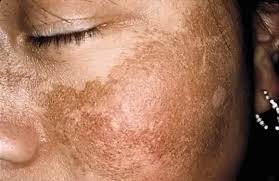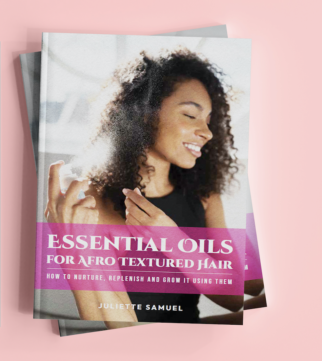Melasma is one of the forms of hyperpigmentation that we as women of color are often challenged with. You know one form as Chloasma, often referred to as the pregnancy mask. But it’s not always pregnancy that brings it into our scope.
 Melasma is a hormone induced condition. You know what that means!, If you’re anywhere near menopause or even experiencing high stress related issues in your life, melanoma could be what’s showing up as uneven skin tone.
Melasma is a hormone induced condition. You know what that means!, If you’re anywhere near menopause or even experiencing high stress related issues in your life, melanoma could be what’s showing up as uneven skin tone.
You will see this uneven skin tone or discoloration on your cheeks, forehead, nose, chin and possibly your upper lips.
Top layer or epidermal melasma (the technical term) is what’s often experienced as tan to brown in color. A lot of you have opted to use laser treatments to rid yourself of melanoma.
This can often bring in another challenge known as PIH, which is post inflammatory hyperpigmentation. Laser treatments can often make the melasma worse. You might also want to avoid chemical peels.
How should it be treated? Typically hydroquinone would be what is recommended for treatment. But hydroquinone has great side affects on skin of color and has actually been banned in Africa, Japan and the European Union.
A topical regimen which will include a daily dose of SPF 30 and a natural skin lightener is recommended as a treatment. You can also add an anti-inflammatory product, something that contains green tea or aloe, to your regimen and watch as your skin begins to calm itself on a daily basis.
Dermal melasma or what appears below the surface and part of the inner layers of your skin tissue, appears gray to grayish brown. If miss diagnosed you could experience severe trauma to your skin.
There are many challenges to deal with when working with hyperpigmentation. How your skin discoloration is diagnosed is critical. Depending on how the skin care therapist diagnosis your challenge, if not done properly, your skin could worsen.
A few things to put on your check list:
- Try to determine when did you first noticed your skin discoloration? Was it after sun exposure, product use, did you start or stop taking a certain medication or was it due to pregnancy?
- Wear sun screens when ever you go outside.
- Check with your family members and see if you have a history of melasma?
Finally …
While melasma can be treated, be patient with yourself as your skin returns to its natural state.
As Always …
Dedicated To Your Beauty,
Juliette Samuel
Esthetician/Author/Publisher




 Facebook
Facebook Twitter
Twitter Delicious
Delicious Digg
Digg Myspace
Myspace StumbleUpon
StumbleUpon Youtube
Youtube